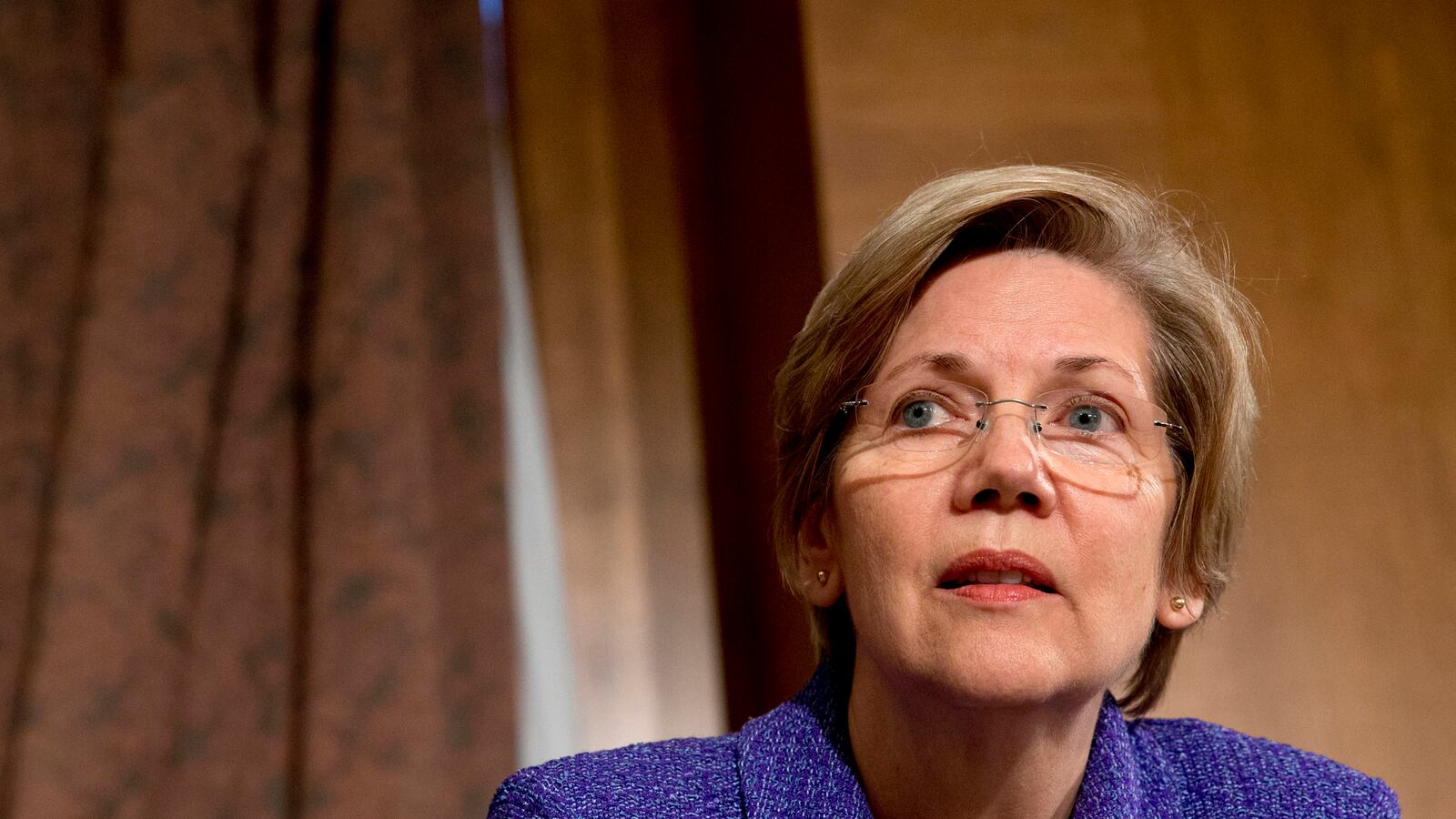If it takes an imagined presidential run to generate interest in her signature issue of banking reform, freshman Senator Elizabeth Warren won’t be issuing any Shermanesque statements.

A professor turned politician, she was among the first to sound the alarm bell on a runaway banking industry, and now she’s using her seat on the Senate Banking committee to warn of another “too big to fail” crisis in the making. Praised for her tenacity in penetrating the obscurity created by Wall Street to shield high-risk derivatives from scrutiny, and her clarity in exposing these practices to the American people, Warren would be a dream candidate for those who cheered last year’s Occupy Wall Street movement, and for progressives in general.
Thinking of her as a possible presidential contender boosts media coverage and helps her cause, and so she will smile and play along if it can advance what she cares about, which is holding accountable the banks that are even bigger today than they were when the crisis hit in 2008. “The big Wall Street banks are not chastened,” she said. “They have fought to hamstring the financial regulations, and they will continue to fight every step of the way.
(Her staff, meanwhile, pushes back at the notion she is being cagey about a possible bid for the presidency. “Senator Warren has been clear that she is not going to run for president,” says her press secretary, Lacey Rose.)
Addressing a Tuesday event on Capitol Hill on “Making Wall Street Work for Us,” sponsored by the Roosevelt Institute, Warren urged action before it is too late, saying it has been five years since the financial meltdown and three years since the passage of Dodd-Frank, legislation to reform the financial industry, yet the four biggest banks are larger today than they were then, and the five biggest banks hold more than half the assets in the country.
“Who would have thought five years after the crisis…that the too big to fail problem would only have gotten worse,” Warren declared. She applauded Treasury Secretary Jack Lew for saying that if more progress isn’t made on the overdue Dodd-Frank regulations, “he may have to look at other options.” Warren skips the diplomatic language and cuts to the chase, assailing a financial system “so besieged by lobbyists it takes years to deliver rules…(which then are) so watered down and ineffective.”
She wants to reinstate the Glass-Steagall Act of 1933, a Depression-era piece of legislation pushed through by FDR that separated depository banking and investment banking.” Her legislation, introduced in July, is titled, “21st Century Glass-Steagall Act of 2013, and she has nine cosponsors, including Republican John McCain, who jokingly tells people that he and Warren, both noted for their outspokenness, are “leaders of the shrinking violet caucus.” The other co-sponsors are mostly liberal Democrats, but the legislation does have Tea Party appeal. A companion bill in the House is titled “Return to Prudent Banking Act of 2013.”
The original Glass-Steagall was repealed in 1999 by Congress during the heyday of the deregulation era with President Clinton in the White House and the economy booming. After the ’08 meltdown, Dodd-Frank was Congress’s attempt to rein in Wall Street’s freewheeling practices. Warren supports Dodd-Frank, calling it “a strong bill, the strongest in three generations,” and says she would have voted for it if she had been in the Senate at the time. But many of its rules are not yet written; regulators have missed 60 percent of the deadlines set by Congress, and when she raises red flags, she is told to wait until all the regulations are issued. “Since when does Congress set deadlines and when regulations are missed, take that as reason not to intervene?”
Warren stays in her lane on Capitol Hill. She is the go-to person on banking regulations and the senator most feared by the banking industry. Her speech Tuesday was a policy statement, not a political speech, though its political appeal is there for the Democratic faithful. “How much longer should Congress wait for the regulators to fix this problem? Another three months, another three years, or until a big banking crisis hits the economy again?” she asks, her passion evident in the quiet fury she brings to what might otherwise be a professorial dissertation.
She is convinced that a new and updated Glass-Steagall “would make banking boring” and that the banks who say they will fail if they can’t use deposits to fund their investments said the same thing in the 1930s. “They’re wrong,” she said. “We’ve got to get back to running this country for American families, not for its largest financial institutions.” That was Warren’s most avowedly political line in the speech that she read at breakneck speed before an attentive audience from the podium.
A political novice—this is her first elective office—she brings an enviable track record of succeeding against great odds. It was Warren who planted the idea with President Obama of a Consumer Financial Protection Bureau. And when it became a reality without her at its helm, she ran for the Senate in Massachusetts and won. Now she’s got too big to fail in her sights. “David beat Goliath with the passage of Dodd-Frank,” she says. “I am confident David can beat Goliath on too big to fail. We just have to pick up the slingshot again.”





